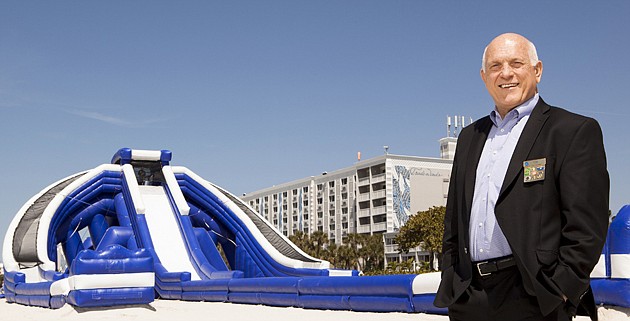- November 25, 2024
-
-
Loading

Loading

Tim Bogott, CEO at TradeWinds Island Resorts, the largest resort complex on Florida's west coast, has a game plan to reshape the popular vacation spot even as families continue to sink their toes into the sand and plunge into the sparkling Gulf.
In 1999, he formed the investment group that acquired the parent firm of TradeWinds, which includes two hotels on St. Pete Beach with a combined 796 rooms. But Bogott faces the challenge of keeping the aging properties current in a state with a total of 370,000 hotel rooms. He just finished a $20 million renovation at the larger Island Grand resort. The company updated the hotel's 585 rooms and added recreational touches, such as a giant, inflatable water slide. More change is under way.
TradeWinds had its best year ever, measured by revenue, in 2012, the CEO says, although he declines to disclose the amount. TradeWinds has raised rates over the past two years, and occupancy, about 73%, is good, though lower than the 80% of earlier years.
The resorts have rebranded the second hotel, formerly known as the Sandpiper, as a Guy Harvey Outpost, under a license agreement. Harvey, born in Germany and raised in Jamaica, is a noted marine wildlife conservationist and artist with a Ph.D. in fisheries management. “His whole purpose is primarily preservation of the oceans and fish,” says Bogott. “We see that environmental protection or environmental awareness is good business. To identify yourself with that sets you apart—it's a point of distinction.”
But rebranding the former Sandpiper's 211 rooms isn't the only change. Even though TradeWinds doesn't face much competition from newer hotels, because the beachfront strip is fully developed and no new properties have been built in the last decade, Bogott and Keith Overton, TradeWinds president and COO, are taking steps for the future.
TradeWinds has sold one of seven buildings at the Island Grand to Bluegreen Corp., a publicy traded timeshare company based in Boca Raton. The aim is to use the proceeds from liquidating the asset to redevelop portions of the resorts, which include some buildings built in 1969, and others built in 1985, and other years. The company sold 204 Island Grand rooms, and is still determining details of the redevelopment, which Overton says will be a combination of rehab and tear-down.
“We've been trying to make this deal work for 10 years. We've never been able to put it together,” says Overton. Several owners and board directors were familiar with Bluegreen, he says. “Through many, many discussions over a couple-of-year period of time we put the deal together.” He declined to reveal terms of the sale.
Branching beyond the traditional hotel model is not new for TradeWinds. In 2003 and 2004, it sold 288 hotel units as condo hotel units, says Overton. The South Seas Resorts Co., where Bogott formerly was president and COO, had a mix of condo, hotel and interval ownership units, says Overton. “This is a common model in the industry.”
The model is not for everyone, however. In 2010, Pennsylvania Attorney General Tom Corbett reached a settlement with Bluegreen to address consumer complaints about marketing, scheduling and other practices, according to the attorney general's office.
Large, independent resorts, such as TradeWinds, face a challenge as they compete with other hotels for a share of the revenue generated by Florida's 89 million annual visitors. “We have to continue to be creative because we don't have a Marriott or a Hilton with a big, nationally recognized brand,” says Overton. Although many of the resorts' customers have been loyal, returning year after year and giving it high marks, increasingly, Internet shopping for bargain rates has eroded some of its customer base.
The resort has weighed the pros and cons of joining a big-name brand. “The problem is, are you better off paying their fee, which in some cases is 10%-12%, if not more, or are you better off taking that 10%-12% and spending it on what works for you?” says Overton. TradeWinds prefers independence, he says. “You don't have somebody in another part of the country telling you what to do when they might not understand what your market calls for.”